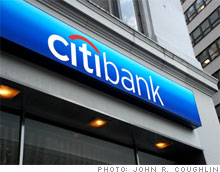Citi still feels sting of bad loans
Company manages narrow profit in latest quarter, but credit issues continue to fester for banking giant.
 |
| Citigroup's consumer banking business reported higher profits in the quarter even as consumer credit issues continued to fester. |
NEW YORK (CNNMoney.com) -- Citigroup's ongoing crusade to return to its former glory as a financial giant may have to wait just a bit longer.
On Thursday, the company reported a slim profit of just $101 million as credit problems, particularly within its consumer-related businesses, weighed down its third-quarter results.
But after taking into account the recent conversion of part of the government's preferred stake in the company into common stock, the New York-based bank reported a loss of 27 cents a share.
As one of the harder hit banks in the crisis, Citigroup has been on a campaign to get back to sustained profitability, going so far as to split the company into two divisions and selling off several of its many diverse businesses in recent months.
Earlier this year, there were signs it was making progress. In both April and July, the company stunned Wall Street by reporting surprise profits.
And while Thursday's results were much better than analysts anticipated, it also left many wondering whether the embattled bank has finally turned a corner.
"There are a lot of moving parts in Citigroup's [third-quarter results]," Sandler O'Neill analyst Jeff Harte wrote in a note to clients Thursday. "But we are generally positive on the results."
Credit woes, for example, one of the biggest trouble spots both for Citigroup and the broader banking industry, moderated from last quarter's levels. But part of that was due to the fact that the company put the brakes on adding to its loan loss reserve.
Those troubles were particularly acute in Citigroup's credit card and residential real estate businesses, although executives at the company were quick to point out that those results were skewed by a card forebearance and President Obama's Home Affordable Modification Program.
"The HAMP program had a rather significant impact on our delinquency statistics," John Gerspach, Citigroup's chief financial officer said in a conference call with analysts.
Other key parts of its business, however, offered a much bleaker view. Profits within Citigroup's investment banking division tumbled from a year ago as the company struggled to stay competitive with better-placed peers like JPMorgan Chase (JPM, Fortune 500) and Goldman Sachs (GS, Fortune 500), both of whom returned government bailout money earlier this summer.
"The investment banking numbers are not a surprise," said Anton Schutz, president of Mendon Capital Advisors, which primarily invests in financial stocks. "I think the government's stake hurts them."
As one of the biggest recipients of government rescue efforts, Citigroup's fortunes have become an area of considerable focus not just on Wall Street, but also on Capitol Hill.
Regulators have been actively trying to steer the bank back toward profitability, hoping the company will soon be in a position to return the $45 billion in taxpayer aid in received over the past year.
In July, pressure from authorities reportedly prompted Ned Kelly to step down as the firm's chief financial officer, with Gerspach, Citi's former chief accounting officer, taking his place.
The company's compensation practices, which many critics have blamed for contributing to the problems both at the company and on Wall Street in general, are currently under review by the Obama administration.
By the end of the month, Kenneth Feinberg, the White House's so-called "pay czar" is expected to make his first in a series of rulings on the pay packages on Citigroup's 100 most highly compensated employees.
Amid such scrutiny, the company announced plans last week to sell its Phibro energy trading business to Occidental Petroleum (OXY, Fortune 500). The sale was largely viewed as an effort to deflect any potential political criticism over a potential $100 million payday for its star trader Andrew Hall.
And Thursday's lukewarm results will likely do little to alleviate some of the pressure currently facing Citigroup Chief Executive Vikram Pandit.
Since being installed at the helm of the company in December 2007, he has faced skepticism about his ability to lead the troubled lender and was criticized for moving too slowly to implement a restructuring plan.
A recent favorable review of Citigroup management, including Pandit, reportedly raised eyebrows among officials at the Federal Deposit Insurance Corp., according to the Wall Street Journal.
Speaking with analysts Thursday, Pandit sounded confident about the company's restructuring efforts, noting that the company's capital levels, a key measure of the bank's ability to absorb losses, was among the strongest in the industry.
He even broached the sensitive issue of TARP, the Treasury's Troubled Asset Relief Program, noting that the company was looking to pay it back "as soon as possible."
"We have been steadily executing our plan to build financial strength," he said. "I feel really good about the progress we have made."
Citigroup (C, Fortune 500) shares, which have lost a quarter of their value since the start of the year, declined more than 5% in late Thursday trading. ![]()


